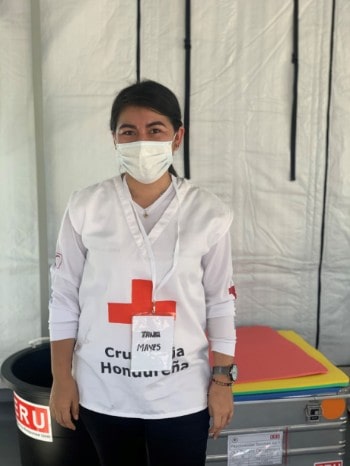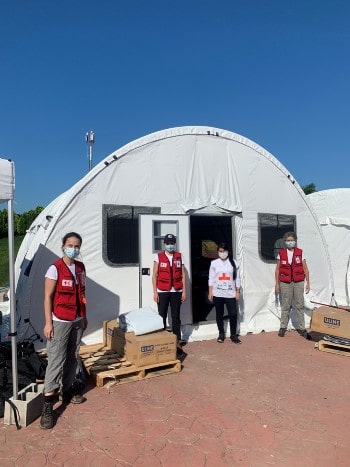The health needs in Honduras following Hurricanes Eta and Iota are vast, but it’s not just the physical health needs that we are seeing on the ground. As a country that has been dealing with impacts of economic instability, violence, the COVID-19 pandemic and now, the aftermath of two destructive hurricanes, the mental health needs in Honduras are immense and cannot be ignored.

Tania, a psychologist and volunteer with the Honduran Red Cross for the last four years, has seen her fair share of devastation from the hurricanes. While her home survived, many of her friends and colleagues lost everything. Yet, every day, Tania comes to the Canadian Red Cross emergency health clinic to provide mental health support to the community.
“When people come in [to the clinic] with lots of emotions because they have lost their homes, we provide that acute care,” she explains of her role. “It’s not just short-term care, we’re looking for long-term care and sustainable solutions.”
This may be easier said than done; in Honduras, like many parts of the world, Tania notes that mental health isn’t always recognized as a medical concern. She explains that this makes it challenging to get close to people to identify their needs.
“It’s hard to talk to people about their mental health,” she says. “People are used to feeling like this.”
This challenge doesn’t deter Tania though, who finds the job rewarding as it gives her the chance to work with different people, including children and youth. She also feels drawn to help people in need.
Though people may not always want to reach out for mental health support, she does see the grief and stress people are feeling and tries to find creative solutions to encourage people to seek support.
“First, you have to find the community leaders,” she explains. “You need to understand their customs and build their trust and then have them inform the community about the services.”

The services she’s referring to are the psychosocial support services being offered at the Canadian Red Cross and Honduran Red Cross emergency health clinic in La Lima. In addition to basic health services, the clinic has three psychosocial support workers whose job it is to focus on the mental health needs of patients.
The space designated for psychosocial support at the clinic has separation curtains to allow for patients’ privacy. There is an area for children to play while their guardians seek services, as well as psychosocial support services for children.
“We use different methods and activities depending on the person,” Tania says.
Supporting people that have gone through concurrent emergencies can also weigh on the mental health of Red Cross personnel, and Tania notes that it can be hard, but she wants to keep doing it.
“Before the hurricanes, my family worried about me doing this work during COVID,” she explains. “But seeing the impacts, I couldn’t not do something. All people have is hope.”
The emergency health clinic in Honduras is made possible thanks to support from the Government of Canada and the generosity of Canadians. To support the efforts on the ground in Honduras, please consider donating to the Hurricane Eta in Central America Appeal at redcross.ca or by calling 1-800-418-1111.

